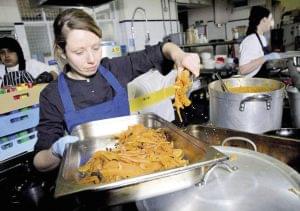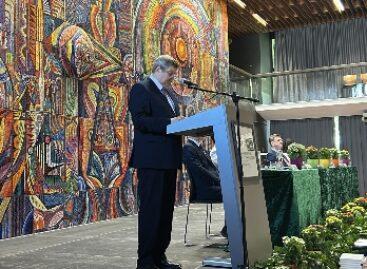Mass catering in the 20.5th century
Members of the presidency of the National Association of Public Sector Catering Service Providers (KÖZSZÖV) – Anna Zoltai, Zsolt Páger, József Némedi and Tamás Végh – answered questions about the current difficult situation caused by the coronavirus pandemic in an online roundtable discussion. We learned that only 12 percent of the country’s mass catering capacity is utilised at the moment. However, there are big differences between the different segments: in educational institutions, this level is 1-6 percent, while in social institutions it is nearly 100 percent. 77 percent of public sector catering workers aren’t active, some of them are on paid leave.

A szociális ellátás változó igény szerint, de zajlott
The cooking ingredient supply is more or less uninterrupted, but the prices have changed. Disposable boxes, rubber gloves, face masks and sanitisers generate extra costs. Those employees who are working in workplace catering are threatened by losing their job, as more than 95 percent of revenues are now lost. Typically hot meals reach people at collection points and via home delivery.
The experts think that cheap and good quality hot meals cooked in mass catering will always be needed. When parents return to work after the pandemic, they won’t have time for cooking any more on weekdays; and for those who lost their job subsidised meals served in public sector catering will be a great help in the battle for financial survival. KÖZSZÖV is doing its best to improve the situation of members at these difficult times. Ever since the beginning of the pandemic emergency, the association has been providing companies with valuable information. In early March they published their first newsletter with the most important information about COVID 19, and more of these followed later. //
Nébih inspections in mass catering during the pandemic
‘The pandemic-induced emergency situation doesn’t mean that public sector catering companies don’t need to comply with food safety, hygiene and quality regulations. However, the changes in the conditions entail a new type of operation by both service providers and the authorities. With this in mind, the inspections by the authorities are now more like supportive visits, when mass catering companies are also provided with information about the situation.’//
Related news
Organic food in mass catering?
The Hungarian Organic Culture Association has launched a petition for…
Read more >At the forefront of the domestic food industry for more than half a century
The future of the food industry is shaped by young…
Read more >Nébih: A grape disease called golden yellows has also appeared in the Villány region
The grapevine disease known as golden yellows has also appeared…
Read more >Related news
Organic food in mass catering?
The Hungarian Organic Culture Association has launched a petition for…
Read more >The number of foreign tourists in Romania increased by 7 percent in May compared to the previous year
The number of foreign tourists in Romania increased by 7…
Read more >(HU) Nagybevásárlás az építkezés szünetében – A nap képe
Sorry, this entry is only available in HU.
Read more >





